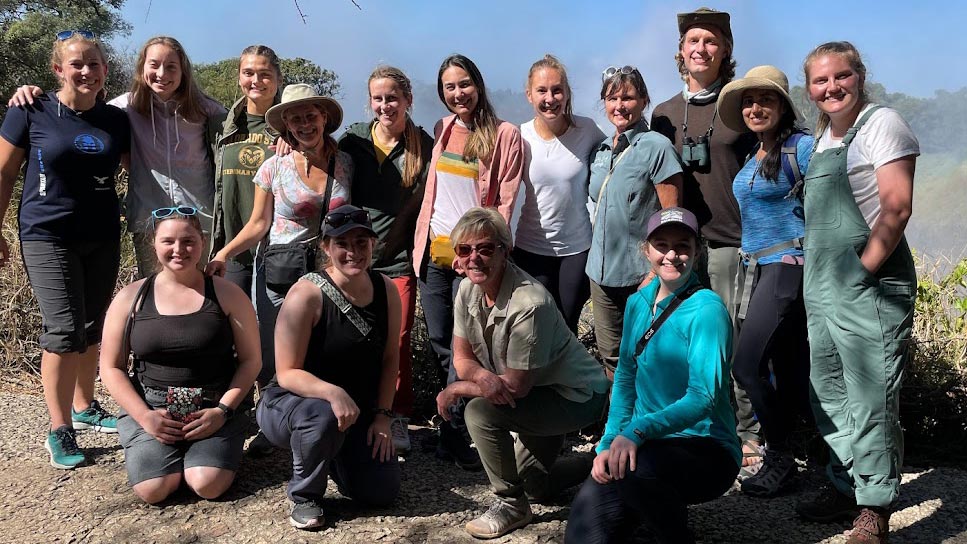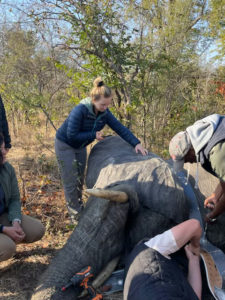
The class and their instructors exploring the Victoria Falls on the first day.
photos courtesy of Danielle Frey
Veterinary students got intensive, practical experience and a glimpse into a One Health approach to wildlife conservation during a new immersive course in Africa, June 11-26.
The pilot course, called Wildlife Medicine in Africa, took 12 veterinary students to Victoria Falls, Zimbabwe, this summer. The course had been delayed since 2020 due to the pandemic.
“The two-credit course was designed to meet the growing interest in wildlife health and conservation among our veterinary students,” said Dr. Danielle Frey, director of Veterinary Student International and Outreach Experiences in the College of Veterinary Medicine and Biomedical Sciences. Frey co-led the course with Dr. Barb Wolfe, associate professor in wildlife health, and a guest instructor, wildlife veterinarian Dr. Mary Wright. The program was hosted by the Victoria Falls Wildlife Trust (VFWT), based in Victoria Falls National Park.

Upon arrival, students dove into a two-day Diseases and Poisonings course, where they learned about common diseases in the region, wildlife-human conflict in Africa, remote capture and anesthesia methods, and how to perform a postmortem forensic investigation. They followed the course with a day in a field-based laboratory, where they learned techniques in sample preparation and processing. Field days with wildlife biologist Roger Parry gave the students experience with telemetry to track animals for research and protection; remote capture for placement of GPS collars; as well as treatment of human-induced injuries such as snares.
In addition to experience with African wildlife, the holistic course provided the students with a unique perspective on One Health at the wildlife-human interface, according to Frey. One Health refers to a transdisciplinary approach to advancing health for humans, animals and the environment. The students accompanied VFWT veterinarians and staff on community-focused efforts for improving health and protection of Zimbabwe’s domestic livestock and small animals. These efforts, in turn, prevent disease transmission to wildlife and humans.
The VFWT team, which included wildlife veterinarians, conservation biologists, laboratory technicians and community liaisons, provided a comprehensive view of the complicated issues at the wildlife-human interface in Africa, as well as innovative solutions in progress. The CSU team of instructors, with experience in wildlife medicine, research, and international community engagement and practice, provided additional expertise and shared experiences. The success of the course paved the way for a long-term collaboration. For more information, contact Dr. Danielle Frey.
Student, faculty and partner testimonials
“Issues of wildlife medicine and conflict are complex and vary widely between regions and countries. Because the Victoria Falls Wildlife Trust approaches these issues in a holistic way that focuses on community, this course provided the students with unique, broad, experiential learning in wildlife forensics, remote capture, population monitoring, laboratory analysis and community engagement at the wildlife-human interface. No other single course could provide such a comprehensive experience. Add to this an engaged and supportive teaching team, safe and comfortable housing and a beautiful environment — what a fantastic way to teach CSU students what wildlife health and conflict are really all about!”
-Dr. Barb Wolfe, DVM, Ph.D., DACZM
“CSU’s wildlife course in Victoria Falls gave me the opportunity to learn about and interact with wildlife in a hands-on manner. I’ve always thought I would be interested in wildlife, but never had the exposure. This course allowed me to experience wildlife medicine in the field, which gives me a better understanding of what kind of medicine I’d like to pursue in the future.”
-Savannah Kennedy, DVM Class of 2024
“This experience included so many different aspects that aren’t quite covered in the traditional curriculum. Learning about the animals and medicine is only the surface. One of the most eye-opening moments was diving headfirst into a different culture, understanding the people and community that are the backbone of true conservation of wildlife. This experience is life-changing with countless unforgettable memories. I know now more than ever that this is the right path for me.”
-Tiera McAdam, DVM Class of 2024
“This course has been instrumental in teaching me the wide variety of skills involved in a career in wildlife conservation as a veterinarian. Working with the Victoria Falls Wildlife Trust was an incredible opportunity to better understand the cross-disciplinary challenges that they work to improve in their region. Working with VFWT highlighted that conservation work must include a variety of approaches, including research, anti-poaching theory, laboratory work and postmortem investigations, human-wildlife conflict mitigation and the many issues at the domestic animal-wildlife interface. For those interested in wildlife health and One Health as a profession, I can’t think of a better way to gain insight into what you really desire from your vocation.”
-Jon Maxwell, DVM Class of 2023
“The graduate veterinary student training course with CSU is important to the Victoria Falls Wildlife Trust as a way to inspire people looking at careers in veterinary medicine, to consider wildlife and conservation and, of course, to demonstrate how people, livestock, wildlife and ecosystems are interlinked. It is critical for veterinarians to keep this interconnection in mind throughout their careers.
“The world needs more wildlife veterinarians and people that have an understanding of One Health, especially in developing countries. We hope this program will not just impart knowledge, but a larger interest in worldwide veterinary medicine. Conservation is not a single species model, but an interwoven one with all of us, and wildlife veterinarians play a key role in helping us conserve wildlife and improve people’s livelihoods and health. Never has this been more evident than now after the worldwide coronavirus pandemic.”
-Jessica Dawson, CEO of the Victoria Falls Wildlife Trust